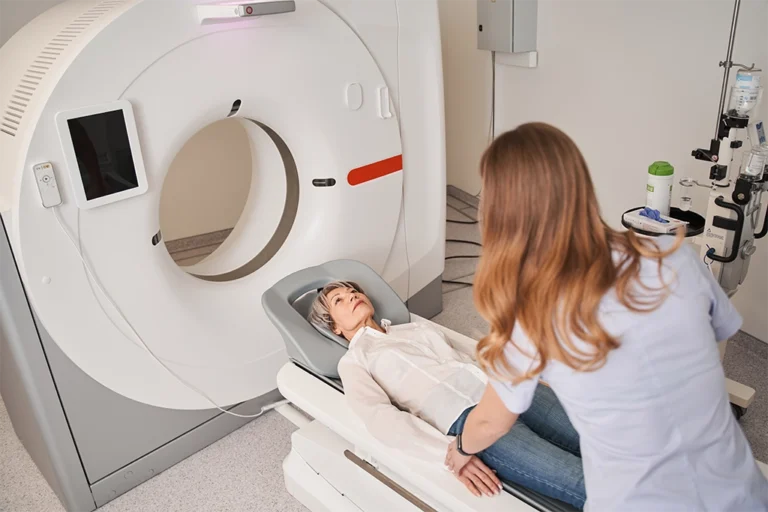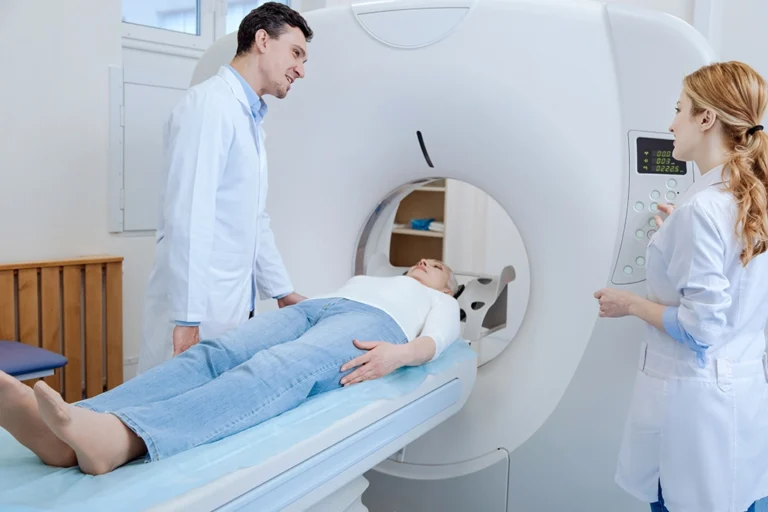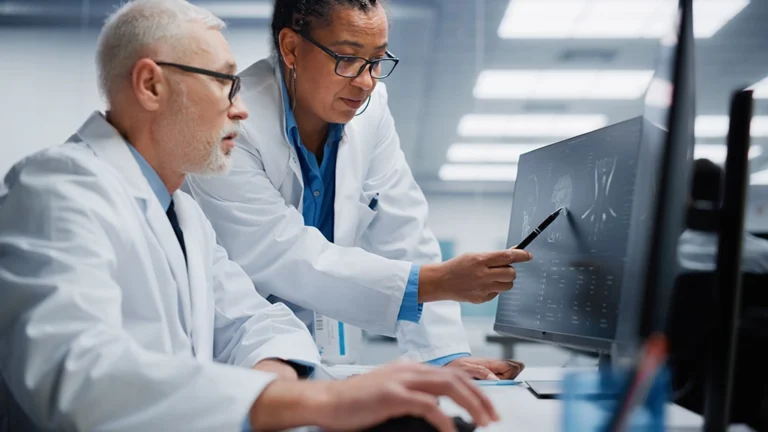Preparing for a CT (computed tomography) scan is easy, but it can get more complicated as CT scans get more specific. Your prep will depend on the area you are getting scanned, whether or not you are getting a CT with contrast, and other factors. Although the preparation instructions are simple, it is important that you follow them for your health and safety.
Across every possible variation of CT scans, though, one thing stays the same: it’s best not to do anything outside your normal routine on the day of your appointment. Don’t participate in anything that could make you late or put you in danger- the day of your CT scan is not the day to try skydiving for the first time! We want your CT scan to go as smoothly as possible, and that starts with you arriving on time and in one piece.
What Should I Do Before A CT Scan?
Before your CT scan, your doctor might tell you or schedule you for a blood test. This is not cause for alarm at all but is actually very routine. If you are scheduled for a CT scan with contrast, you will need a blood test before your scan to check for potential issues or allergies to contrast dye.
On the day of your scan, follow the instructions your doctor has recommended for fasting (ask your doctor if they haven’t given you any instructions). Likely the recommendation will be to be on a diet of clear liquids during the day of your CT scan, which helps guarantee clear and detailed final images. The following scans, though, require fasting for a few hours before your scan:
- Head CT – don’t eat anything for 3 hours before your scan (clear liquids encouraged)
- Neck CT – don’t eat anything for 2 hours before your scan (clear liquids encouraged)
- Abdominal CT – don’t eat anything for 3 hours before your scan
- Pelvic CT – don’t eat anything for 2 hours before your scan
- CT of the Extremities – don’t eat anything for 2 hours before your scan
(If you are getting any of these CT scans with contrast, don’t eat or drink anything for 4-6 hours before your scan)
* talk to your doctor about specific requirements and recommendations anytime before the day of your exam
If you are getting a CT scan of your abdomen or pelvis, food digestion can obscure certain structures or areas. Even toothpaste that you might swallow when you brush your teeth in the morning could cause your images to turn out lower quality (so be careful and try to brush your teeth before the 3-hour window!). The best way to prevent obstruction during your scan would be to drink clear liquids (anything you can see through: water, juice, clear broth, etc.).
If your scan is later in the day, a good light breakfast could be tea, coffee, or fruit juice, with a side of fruit and white bread (with no butter, preferably). It’s best to stay away from foods that are very greasy and hard to digest. Whole foods like fruits and vegetables are the safest option. As for water, try to drink about 1 liter before your scan (about 4 cups). You can drink coffee and other caffeinated beverages, but be sure to double-check with your doctor before your scan.
If you accidentally eat on the day of your exam, there are a few options. First, you could reschedule your exam – this would be the best option if you are getting a scan of your abdomen or pelvis. If you are getting a CT scan of an area of your body that is not highly affected by digestion (head, neck, legs, etc.), you can proceed with your exam like normal. Talk to your doctor or technician and be honest about eating before your scan and they can direct you on how to proceed.
What Can I Wear During A CT Scan?
Now that we’ve covered what can go into your body, let’s talk about what can go on your body. Because of the machinery used in a CT scanner, you must not wear anything metal inside. This means wearing comfortable clothing without any metal on it (zippers, clasps, buttons, etc.). If you do wear clothes with metal on them, you will be asked to change into a hospital gown for your scan. Sometimes if you get a CT scan of your head and neck, you are allowed to keep on pants like jeans, but it’s always better to be safe than sorry and wear comfy sweatpants.
You will also need to remove all your jewelry and removable implants like dental pieces or hearing aids. If you feel more comfortable wearing a mask during your scan, you are allowed to (as long as it doesn’t have any metal on it!).
Do your best to not wear any creams, lotions, or powders to your scan. Some of these items can contain microscopic bits of metal that will react badly inside the CT scanner. Try to avoid wearing deodorant, mascara, any makeup or cosmetics, nail polish, or heavy creams to your scan. It is best to come to your appointment without any of these self-care products on, but if you do, your technician might ask you to wipe them off before your scan.
How Do I Prepare For A CT Scan?
It’s always good to arrive 5-15 minutes before your appointment time, just in case the staff is ready early, or to communicate new information. This window of time will also allow you to prepare yourself for the scan – getting dressed, taking off jewelry, using the restroom, etc. Hopefully, when you arrive for your appointment, you will only have to wait a short while before your scan can start.
For some abdominal CT scans, your technicians may ask you to drink clear liquids or contrast dye before your scan starts. This is to help them visualize your interior structures. If your doctor ordered a CT scan with contrast, they likely want more variation between vessels or structures inside your body. Doctors use a contrast dye to discover blockages in your systems or to check if areas are getting enough blood flow.
A contrast solution is simply dye that is either injected in the arm or swallowed, depending on what structures it’s being used to distinguish. For iodine-based contrast solutions, drinking more liquids or water can help flush it from your system after your scan is completed. The contrast will likely be gone from your system in 24-48 hours. You may experience bruising or injection site pain, but talk to your doctor if these symptoms are persistent: nausea, headache, hives, itching, or flushed skin.
A CT scan with contrast is not higher quality than a CT scan without contrast. When your doctor orders a CT scan with contrast, that simply means they want more distinction between certain vessels or structures inside your body. If your doctor has ordered a CT scan without contrast and you’re concerned about the quality of the scan, talk to your doctor. Likely whatever area or structure they are hoping to image does not require the type of visibility contrast solution would provide. If you are for some reason unable to ingest or be injected with a contrast solution, don’t worry. CT scan machines are still capable of getting high-quality images without additional help.
What Happens After A CT Scan?
After your scan is over (usually around 30 minutes), you will be able to drive home and return to your routine. You may feel a bit of fatigue after your scan, but this will likely be due to the stress of getting a medical scan. Your technician will probably suggest drinking around half a liter of liquid (about 2 cups) afterward, simply to replenish your body. Your CT scan results should be ready within 24 hours. Your technician will send your scans to your doctor, who will reach out to schedule a follow-up appointment and potentially create a treatment plan.
CT scans use a small amount of radiation to capture their images. That sounds scary, but the truth is the amount is so small that it won’t affect you or your health at all. After your scan, you will be able to hang out with other people without fear of the radiation affecting them. Be sure to do whatever you and others feel comfortable with, and try to stay away from people who may be pregnant for about 4 hours after the scan.
How to schedule an appointment with us
Now that you know everything from how to prepare for your CT scan to what to expect after, all that’s left is to schedule your exam. At South Jersey Radiology Associates, we offer high-quality CT scans with a personal, professional touch. Call us today to schedule an appointment at any of our following locations:
- Haddonfield Office – Haddonfield, NJ
- Marlton (Greentree) Office – Marlton, NJ
- Medford Office – Medford, NJ
- Moorestown Office – Moorestown, NJ
- Mount Laurel Office – Mount Laurel, NJ
- Route 73 (Voorhees) Office – Voorhees Township, NJ
- Turnersville Office – Turnersville, NJ
- Voorhees (Carnie Blvd) Office – Voorhees Township, NJ
- Sewell (Washington Twp) Office – Sewell, NJ
- West Deptford Office – West Deptford, NJ
- Willingboro Office – Willingboro, NJ
Learn more about the board-certified, sub-specialized radiologists who read and interpret studies at SJRA, here.
Frequently Asked Questions
Before a CT scan, your doctor may schedule a blood test, which is routine and not cause for alarm. If you are getting a CT scan with contrast, a blood test is required to check for potential issues or allergies to the contrast dye. On the day of the scan, follow any fasting instructions given by your doctor. Typically, a clear liquid diet is recommended, but specific fasting times vary depending on the area being scanned.
To ensure safety and accurate imaging, avoid wearing anything metal inside the CT scanner. Choose comfortable clothing without metal, such as zippers, clasps, or buttons. If you wear clothes with metal, you will be asked to change into a hospital gown. Jewelry, dental pieces, hearing aids, and removable implants should be removed.
Arrive 5-15 minutes before your appointment time to prepare for the scan. This includes getting dressed, removing jewelry, using the restroom, etc. For certain abdominal CT scans, you may be asked to drink clear liquids or contrast dye before the scan to enhance visualization. If your doctor ordered a CT scan with contrast, it is to provide better distinction between structures. After the scan, you can drive home and return to your routine. Drinking fluids afterward is recommended for hydration.
After the scan, which usually takes around 30 minutes, you can resume your normal activities. Your CT scan results should be ready within 24 hours, and your doctor will schedule a follow-up appointment to discuss the results and potential treatment plans. The amount of radiation used in a CT scan is small and won’t affect your health or the people around you.
South Jersey Radiology Associates offers high-quality CT scans at multiple locations. To schedule an appointment, you can contact any of the following locations:
• Haddonfield Office – Haddonfield, NJ
• Marlton (Greentree) Office – Marlton, NJ
• Medford Office – Medford, NJ
• Moorestown Office – Moorestown, NJ
• Mount Laurel Office – Mount Laurel, NJ
• Route 73 (Voorhees) Office – Voorhees Township, NJ
• Turnersville Office – Turnersville, NJ
• Voorhees (Carnie Blvd) Office – Voorhees Township, NJ
• Sewell (Washington Twp) Office – Sewell, NJ
• West Deptford Office – West Deptford, NJ
• Willingboro Office – Willingboro, NJ
The CT scan results are read and interpreted by our team of board-certified, subspecialized radiologists. Our radiologists have expertise in various specialties, ensuring accurate and thorough evaluation of the scan results. You can learn more about our radiologists by visiting our physician profiles.




